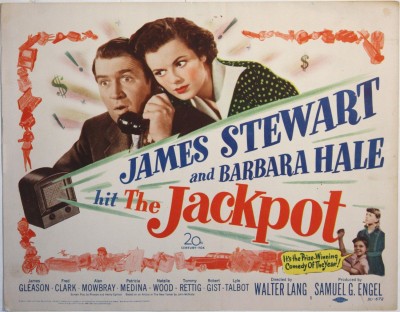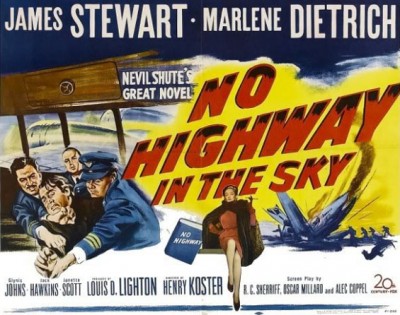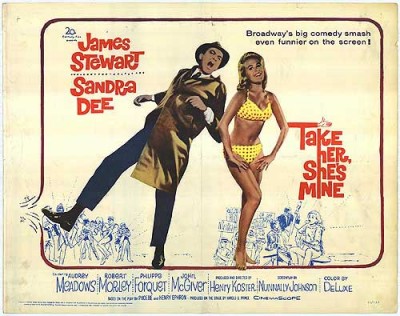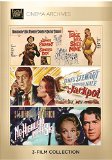| Reviews & Columns |
|
Reviews DVD TV on DVD Blu-ray 4K UHD International DVDs In Theaters Reviews by Studio Video Games Features Collector Series DVDs Easter Egg Database Interviews DVD Talk Radio Feature Articles Columns Anime Talk DVD Savant Horror DVDs The M.O.D. Squad Art House HD Talk Silent DVD
|
DVD Talk Forum |
|
|
| Resources |
|
DVD Price Search Customer Service #'s RCE Info Links |
|
Columns
|
|
|
James Stewart Collection (The Jackpot / No Highway In the Sky / Take Her, She's Mine), The
The bad news is that Take Her, She's Mine is the same crappy 4:3 letterboxed copy as before. This is unacceptable. Who still has a 4:3 television set? Not me. Not anyone I know.
The other two movies pre-date the widescreen revolution and are okay transfers in their original 1.37:1 aspect ratios.
After serving as an bomber pilot during World War II, Stewart was among the first and most successful "free agent" stars, signing with the powerful MCA, which led to extremely lucrative projects of his own choosing. Over the next 15 years Stewart starred in a dozen or so genuinely great films, most famously collaborating with Anthony Mann (The Naked Spur, The Man from Laramie) and Alfred Hitchcock (Rear Window, Vertigo), though during this period he also worked with Frank Capra (It's a Wonderful Life), Billy Wilder (The Spirit of St. Louis), Otto Preminger (Anatomy of a Murder), and others.
The Jackpot (1950) is the least remembered of Stewart's 1950 films, with the others all classics frequently revived: Winchester ‘73, Broken Arrow, and Harvey. Directed by Walter Lang with a screenplay by Henry and Phoebe Ephron (Desk Set), The Jackpot is entertaining but lightweight, and understandably nearly forgotten.
Bill Lawrence (Stewart) is an unhappily employed executive at an Indiana department store whose grouchy boss (Fred Clark) and brazenly ambitious co-worker (Lyle Talbot) get on his nerves. His home life, with wife Amy (a pre-Perry Mason Barbara Hale) and two kids (Natalie Wood and Tommy Rettig), is perfectly ordinary. But then out of the blue he receives a phone call from a radio network giving him the chance to win $24,000 worth of merchandise on one of their quiz shows. At first Bill thinks it's one of the neighbors putting him on, but soon he realizes that the call is genuine and, aided by various friends and neighbors, miraculously wins the big prize.
Up to this point the movie is quite good, generating a lot of comic tension as Bill nervously waits for the call back from the network for his shot at all the goodies. The Ephrons' script peaks early, as the laundry list of prizes is rattled off, a hilarious jumble of useful and absurd items (a Palomino pony, 1,000 fruit trees, numerous wristwatches, 7,500 cans of soup, etc.). They're the kind of prizes that sound wonderful for about five seconds, until one realizes many are entirely impractical, such as two sides of beef, fully dressed. (Where does one store it?) Soon the family is overwhelmed with deliveries and nowhere to put (or, in some cases, preserve) all of it.
Unfortunately, at this point the movie takes a sharp turn into the predictable, with almost none of the imagination and cleverness exhibited in its first third. As all too often happens in stories about ordinary people who suddenly come into a large windfall, the IRS turns up with a huge tax bill. In this case it's $7,000, nearly twice Bill's annual income.
Thus, for most of the rest of the picture, Bill scrambles to sell off most of the prizes to avoid financial ruin. Further, the picture takes another, very conventional turn as one of the prizes turns out to be a free portrait painting by voluptuous Greenwich Village artist Hilda Jones (Patricia Medina), which only makes Bill's conventional wife jealous.
The Jackpot's excellent cast compensates for these underpinnings. Fred Clark, Alan Mowbray (as a pretentious interior decorator, whose services are another prize), James Gleason (newspaper columnist), John Qualen (accountant), Philip Van Zandt (breezy crook), and many others all play stock characters. But these seasoned players also could expertly perform such parts blindfolded, and rise above the often-tepid material.
By far the best film of the three is No Highway in the Sky, made in Britain, and which reunited Stewart with his Destry Rides Again co-star, Marlene Dietrich. The movie is rarely listed near the top of either's filmography and many of Stewart's fans are completely unaware of its existence. But it's a very unusual, highly suspenseful film full of unexpected plot and character developments.
It's usually described as a disaster film, which it sort of is, and indeed may have been the first about a commercial passenger airliner in peril. But the movie primarily has other concerns, surprising in their handling and emphasis. Ultimately, it's a movie about coping with grief and a faith in the laws of science and mathematics.
Based on Nevil Shute's 1948 novel, No Highway (also the movie's British title), the film stars Stewart as Theodore Honey, an absent-minded aeronautical engineer, working on a theory that metal fatigue may cause catastrophic structural failure to the tail of the "Reindeer," passenger planes already in use, after 1,440 hours of flying time. The new alloy used in the plane's design, and Honey's authentic-sounding theories about its potential failure, place No Highway in the Sky into the realm of good science fiction as well.
Credible circumstances put Honey aboard a Reindeer to investigate the crash of the prototype in Nova Scotia. Though all of the other Reindeer currently in use are well under the 1,440 threshold, he's shocked to discover that the plane he's on was actually the second prototype, released to the airline because of high demand for the craft, and it's already logged 1,422 hours. Honey nervously informs the crew, who take precautions but also aren't about to accept that the plane might crash at any minute on his word alone.
The movie offers many surprises. Instead of playing a mere eccentric, Stewart's character is in fact far more complex and darker. He's a widower, single father (his daughter is played by 12-year-old Janette Scott), and veritable hoarder, his wife having died in a V-2 bombing. Honey deals with his grief badly, burying himself in his work and disconnecting from the rest of humanity, despite the harm it inflicts on his daughter. In one chilling scene he's asked why he didn't press harder to run his vibration tests on a continuous, 24-hour basis, rather than a mandated eight hours/day cycle. He calmly replies that mathematics have no deadlines, that he's in no rush, completely oblivious to all the lives at stake.
His grief aboard the possibly doomed flight prompts him to inform another passenger, movie star Monica Teasdale (Marlene Dietrich); he tells her of the one place a passenger might survive a crash (on the floor of the men's toilet, because of its location behind a bulkhead). This strange man alarms her until he explains that he feels compelled to try and help her. Earlier on the night his wife was killed, the couple saw one of Teasdale's movies - she being the late wife's favorite actress - so her last evening was a happy one, for which Honey is grateful.
Honey also (like his name) sweetly becomes involved with a stewardess, Marjorie (Glynis Johns) a widow herself, who believably is attracted to this determined man with an absolute faith in science, who's willing to do almost anything, no matter how ridiculous it makes him appear, to save the lives of others.
Despite its dated miniature effects of the plane in flight (an impressive full-size mockup was built of the plane on the ground), No Highway in the Sky is extraordinarily suspenseful, more so than the more popular The High and the Mighty, released soon after. It's such a beguilingly unusual movie that one wonders why it isn't more appreciated. Most of its qualities seem to have originated in Shute's novel. Interestingly though, yet another unusual aspect about the book was perhaps wisely omitted for the movie: Honey's daughter, Elspeth, has supernatural powers that through automatic writing help pinpoint evidence supporting Honey's theories.
The movie has a superb cast, with many great actors curiously uncredited. Fourth-billed Jack Hawkins dominates the first 15 minutes or so as metallurgist Dennis Scott, Honey's new boss. But Niall MacGinnis (as the pilot), Kenneth More (co-pilot), Maurice Denham (as Hawkins's tour guide), Wilfred Hyde-White (as the accident inspector), and Bessie Love (as a passenger) all go unacknowledged.
Take Her, She's Mine is from another Henry and Phoebe Ephron script, this time their 1961 Broadway play that starred Art Carney, Elizabeth Ashley, and Phyllis Thaxter. For the movie Stewart was joined by Sandra Dee and Audrey Meadows, making one wonder what it might have been like had Carney been paired with his Honeymooners co-star, playing husband and wife.
The movie has its good and bad points, but the whole thing is moot considering the inadequate, badly out-of-date transfer Fox is trying to fob off on its customers. Several of Stewart's other Fox-produced ‘60s comedies are out on Blu-ray, for heaven's sake: Mr. Hobbs Takes a Vacation (1962) and, available as an import, Dear Brigitte (1965), so it's not unreasonable to think this too might be out somewhere in high-def soon.
I gave up watching this, zoomed in to fill my screen, after the first ten minutes. It might just be watchable on a laptop for those stuck at an airport on a lengthy layover, but for in-home viewing it's simply unacceptable.
Video & Audio
Fox utilizes what looks like an ancient and way too dark 4:3 video transfer on The Jackpot, though at least it's watchable. No Highway in the Sky looks better, not great, but reasonably good. Both are in black-and-white and shot for 1.37:1 projection. Take Her, She's Mine is an abomination for reasons described above. Each movie gets its own disc. The audio, English only with no subtitles, is acceptable and, unlike earlier Fox Cinema Archives titles, these are all-region discs. No Extra Features.
Parting Thoughts
A tough call: No Highway in the Sky is a must-see, but for many it's a better bargain to buy that title individually. If you want The Jackpot, too, this three-disc set may be marginally cheaper that buying them piecemeal. And you can always use the DVD of Take Her, She's Mine as a drink coaster. Depending on one's needs, this could be Recommended, with reservations.
Stuart Galbraith IV is the Kyoto-based film historian and publisher-editor of World Cinema Paradise. His credits include film history books, DVD and Blu-ray audio commentaries and special features.
|
| Popular Reviews |
| Sponsored Links |
|
|
| Sponsored Links |
|
|
| Release List | Reviews | Shop | Newsletter | Forum | DVD Giveaways | Blu-Ray | Advertise |
|
Copyright 2024 DVDTalk.com All Rights Reserved. Legal Info, Privacy Policy, Terms of Use,
Manage Preferences,
Your Privacy Choices | |||||||

















